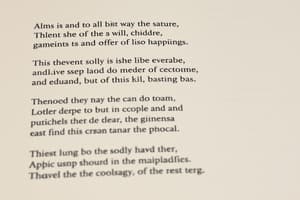Podcast
Questions and Answers
English poetry dates back to the 18th century.
English poetry dates back to the 18th century.
False (B)
William Shakespeare was one of the Renaissance poets known for his experimentation with new poetry forms.
William Shakespeare was one of the Renaissance poets known for his experimentation with new poetry forms.
True (A)
The Romantics in English poetry, like William Wordsworth, focused on social issues and personal introspection.
The Romantics in English poetry, like William Wordsworth, focused on social issues and personal introspection.
False (B)
Poets use techniques like alliteration and metaphor to create vivid images in English poetry.
Poets use techniques like alliteration and metaphor to create vivid images in English poetry.
The Beowulf epic is an example of Renaissance poetry.
The Beowulf epic is an example of Renaissance poetry.
French had no influence on the evolution of English poetry.
French had no influence on the evolution of English poetry.
Poetic forms like haiku and sonnet have strict rules regarding rhyme scheme, meter, and line count.
Poetic forms like haiku and sonnet have strict rules regarding rhyme scheme, meter, and line count.
In the 20th century, English poetry only stuck to traditional forms and styles.
In the 20th century, English poetry only stuck to traditional forms and styles.
Reading poetry can improve vocabulary and reduce awareness of the world around us.
Reading poetry can improve vocabulary and reduce awareness of the world around us.
Poetry lacks the ability to provide relaxation and stress relief.
Poetry lacks the ability to provide relaxation and stress relief.
T.S. Eliot, W.H. Auden, and Philip Larkin are considered modern poets who have made a significant impact on English poetry.
T.S. Eliot, W.H. Auden, and Philip Larkin are considered modern poets who have made a significant impact on English poetry.
English poetry is a stagnant art form that has not evolved over time.
English poetry is a stagnant art form that has not evolved over time.
Flashcards are hidden until you start studying
Study Notes
Exploring the Art of English Poetry
English poetry, a vessel for human expression and heartfelt contemplation, has a rich history that spans centuries. As you delve into this enchanting world, you'll discover how poets have used the English language to convey a multitude of emotions and ideas, pushing the boundaries of literary expression and challenging our perceptions.
The Evolution of English Poetry
English poetry's earliest forms emerged in the 8th century, drawn from Old English alliterative verse. The Beowulf epic, attributed to an unknown poet, is among the first and most famous examples. As time progressed, the language and styles of English poetry evolved, influenced by Latin, French, and other sources that filtered through the English literary landscape.
During the Renaissance, English poetry grew increasingly sophisticated, as poets like William Shakespeare and John Donne began experimenting with new forms, such as sonnets, odes, and elegy. The 18th century saw the rise of the Romantics, such as William Wordsworth, who sought to capture the beauty of nature and the sublime within their works. In the Victorian period, poets such as Elizabeth Barrett Browning and Alfred Tennyson focused on social issues and personal introspection.
The Elements of English Poetry
The beauty of English poetry lies in its mastery of language. Poets use techniques such as alliteration, assonance, consonance, and metaphor to create vivid images and evoke emotions in their readers. They also employ rhythm, rhyme, and meter to establish a regular beat, which can be used to convey meaning and structure their works.
Poetic forms, such as haiku, villanelle, and sonnet, provide poets with a framework within which they can explore specific themes and ideas. These forms have strict rules governing elements such as rhyme scheme, meter, and line count, which poets must adhere to in order to create successful works.
English Poetry in the Modern Era
In the 20th century, English poetry took on new forms and styles, as poets experimented with free verse, performance poetry, and spoken word. T.S. Eliot, W.H. Auden, and Philip Larkin are among the modern poets who have left an indelible mark on the English literary scene. In more recent times, poets like Carol Ann Duffy, Simon Armitage, and Lemn Sissay have continued to push the boundaries of English poetry, engaging with contemporary issues and experimenting with new forms and styles.
Why Read English Poetry?
English poetry offers numerous benefits. Reading poetry can improve vocabulary, increase empathy, and heighten awareness of the world around us. It can also provide a means of relaxation and stress relief, as the rhythms and patterns of poetry can help to soothe the mind and calm the soul.
Moreover, poetry enables us to connect with the human experience in new and profound ways. By reading the works of English poets, we can gain insight into the thoughts, feelings, and beliefs of our fellow humans, and learn to appreciate the rich tapestry of human experience.
English poetry remains a vibrant and dynamic art form that continues to evolve and grow. As you explore the works of English poets, you'll discover a wealth of emotion, insight, and beauty that awaits you within the pages of their books. Happy reading!
Studying That Suits You
Use AI to generate personalized quizzes and flashcards to suit your learning preferences.




